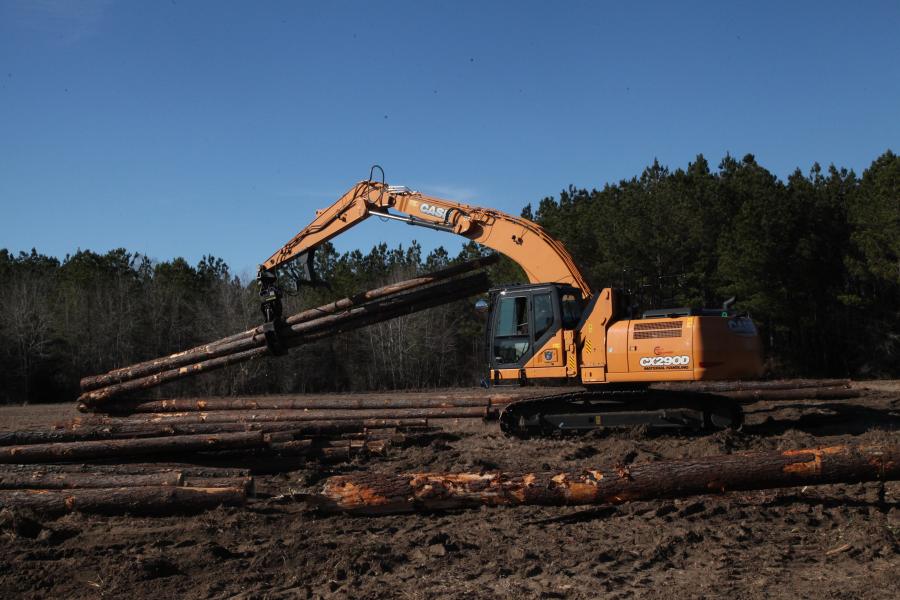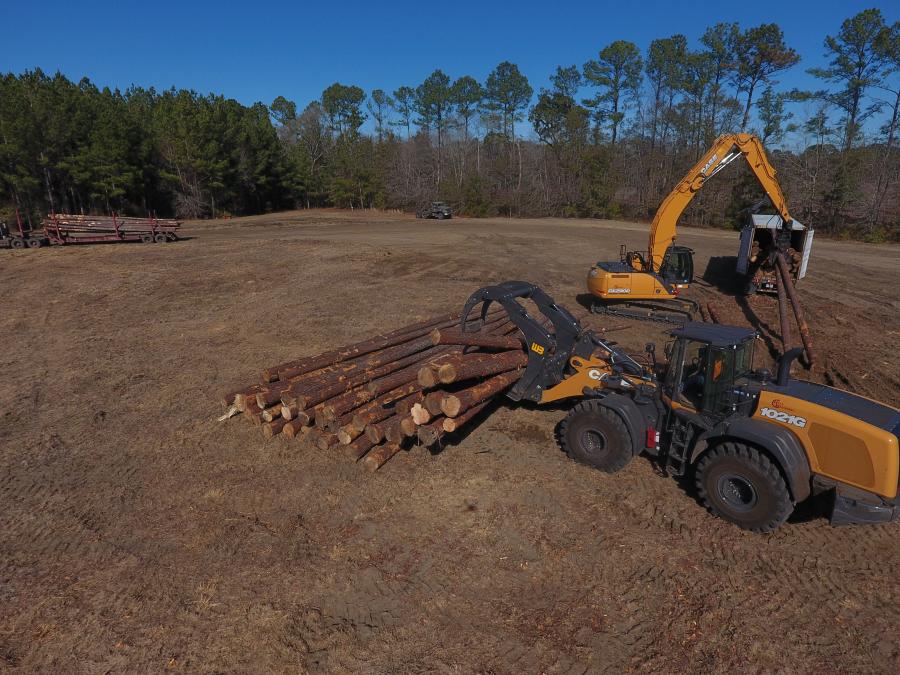With cut timber coming in faster and faster, IFR is challenged with keeping the operation going in order to maximize its profit.
Founded in the winter of 2017, Integrated Forest Resources of South Carolina is, by all accounts, a brand new company — but they have a strong history in forestry and land management.
“I went to school to study forestry at Clemson University. Graduated in 1994,” explained Trip Chavis, president of Integrated Forest Resources (IFR). “And I've been in forestry ever since in some form or fashion.”
Seeing low demand in local markets and an opportunity to market timber to international buyers, Chavis developed a partnership with a landowner with more than 14,000 acres of timber and several logging companies in order to get the operation started.
“We have an extensive background in land management and a very good understanding of what the wood markets and supply look like in South Carolina, and we recognized the need in the market to increase consumption of standing timber — specifically saw wood — and had a land owner here that was willing to participate with us, and decided we were going to make a go of it.”
Acres of Opportunity
IFR began its operation on a small yard in partnership with a single logging company. Working in tandem with the loggers, IFR moves cut timber and loads it into containers for international shipping. Quickly outgrowing the area, IFR now operates on a 22-acre plot of land.
“To start our operation we moved in with a logger. They would cut the wood, they'd sort it and then physically drag the wood over to our deck, and then we'd pick it up and load it in a container.”
“We were in a very limited space, less than an acre. We've got 22 acres here now. We outgrew that very quickly. It was the best way for us to hit the ground running and gave us some time to prepare this location, where we'll have to accommodate a much larger supply.”
No Easy Task
With cut timber coming in faster and faster, IFR is challenged with keeping the operation going in order to maximize its profits — all while perfecting the process on the fly. Chavis discusses the challenges of starting this type of operation from the ground up.
“It was a learning curve that was like nothing I've ever experienced. However, because of the speed of things, the way the wood is coming in and the demand for the containers going out, you adapt quickly. It's generally one problem at a time, and you tackle this problem and you find another problem, but the problem usually generates a solution to a much more long-range success. Each of these challenges that we've run into have been challenges but they have also been learning experiences that I think will help us in the long run.”
One of the most critical components of the new business is its heavy equipment. Chavis called Jim Hills of Hills Machinery Company when it came time to outfit the new yard.
“I called Jim Hills and Charlie [Mengedoht] and they came by and we talked about the demands. Weight was a big consideration, how we're going to move the wood around and how much wood the wheel loader with the log grapple in particular could hold.
“As we unload log trucks, how many grabs is that going to take as we move these logs around? Obviously the more trips we have to make, the more inefficient we are, so the capacity of the machines was probably the biggest consideration. Hills Machinery helped me walk through all of that.”
Working with Hills, Chavis decided to build his fleet with Case equipment, including a CX290D excavator/material handler and a 1021G wheel loader.
“The wheel loader is unloading log trucks that come to the yard, then taking that and placing it in a staging area where the material handler will sort according to size. Then the wheel loader will come back and place those sorted logs in their proper location in the yard.”
CX290D Material Handler

In order to sort piles of lumber throughout the day, Chavis needed a machine that was both powerful and nimble, with good visibility. The CX290D is a machine that is specifically configured for material handling and features a 177 hp Tier IV Final engine, a hydraulically controlled elevating cab and a longer arm and boom with optimized hydraulic circuits for heavy-duty attachments.
“It had to be mobile, we knew that we couldn't have a stationary loader. We knew we had to have something with a grapple and the elevated cab was particularly of interest to me. We knew we had criteria for mobility and capacity with regard to weight. With the expansiveness of this yard, the raised cab is going to be an asset that will serve us well.”
Advances in diesel engine technology have led to significant improvements in fuel efficiency, and Chavis says that the CX290D is performing even better than estimated in the original business plan.
“I think the fuel consumption has been probably 25 percent less than what I anticipated. It means everything in a new operation when I've got to spend 25 percent less in fuel in a month. That means everything. Long-term it could be very significant. I don't anticipate that changing.”
1021G Wheel Loader

When it comes to unloading log trucks and moving timber all day, power, speed, safety and fuel economy are the factors that most influenced machine selection. Chavis chose a Case 1021G wheel loader with a heavy-duty log grapple to help his growing operation.
“We knew we were going to have to unload a log truck, and the less trips we've got to make to unload that log truck, the less time the driver has got to wait for us to unload his truck, [and] the less fuel we're burning unloading that truck. We knew the particular log grapple that we had identified needed to mesh obviously with the wheel [loader]. Again, it came down to a solid recommendation from [Hills Machinery].”
“After having gone through this now for a couple of months, we've absolutely got the right machinery on the yard and would anticipate having additional machinery. Really, we could use another wheel loader to be at our top efficiency.”
Planned Maintenance and Machine Support
The CX290D and 1021G both come standard with Case ProCare, a suite of product assurances that includes a three-year Advanced Case SiteWatch telematics subscription; a three-year/3,000-hour full-machine factory warranty; and a three-year/3,000-hour planned maintenance contract.
“That was actually a big factor to us. We didn't want to be bogged down with scheduling maintenance and worried about a machine running out of warranty while it was on our yard, and that was actually a huge factor in our decision.
“Hills monitors the hours that are on our machines and any other analytics that are important to them. Without us having to make a phone call to say 'hey we're at our 100-hour mark,' they're calling us and they're coming out and performing maintenance on the machines. Making sure they're running properly, as well as the routine stuff like oil changes and hydraulic fluid.”
“They've not only been a vendor to us, but they've been a partner. Charlie, our sales rep, has just been golden to us; he picks up the phone when you call him, and there's always a response when you need something in a very timely manner.”
With the right people, the right equipment and a business model that is poised for growth, IFR is already planning to expand its operation.
“Once we figure out how many containers we can efficiently load without breaking the machines or our people, then we'll simply duplicate that process. We'll add two more machines and four more people and create another line. We can do that here; we've got enough room. That's our expansion plan.”
“I think we're just trying to make a difference in the timber markets in South Carolina, and we know we've got a resource that's plentiful here; we've learned to grow trees faster and more efficiently than ever before. The wood keeps on growing, so we better find a way to merchandise it in a way that's responsible.”
This article is written and presented in loving memory of Charlie Mengedoht of Hills Machinery, who proudly served Integrated Forest Resources and all of his clients throughout the Carolinas.
CEG
This story also appears on Forestry Equipment Guide.
Today's top stories
















